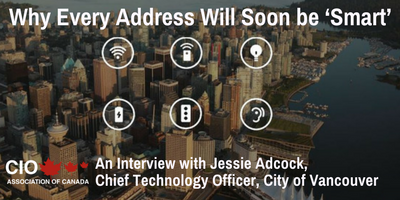Jessie Adcock, Chief Technology Officer, City of Vancouver will be a panelist at the upcoming CIO Peer Forum in Vancouver on Why Every Address Will Soon be ‘Smart’– How loT & Digital Engagement Change Everything
Overview of Vancouver:
Vancouver is a large global destination city with millions of people coming and going daily between its approximately seven hundred thousand residents, those who work and play in the city and live in other neighbouring municipalities and tourists visiting from across the world. Thirty million people use our website annually and a million calls come into our call center. The metro Vancouver region population represents the third largest metro region in Canada.
Q. Do you think ‘smart’ addresses are in the plans for the future at the City of Vancouver?
A. The idea of a smart address is very interesting and reveals a lot about how technology is evolving. A Smart address is a virtual representation of a physical address. There could potentially be a day in the future whereby we could virtually locate ourselves based on wireless technology. I’m not sure that that day is in the near term. Privacy is a major consideration and will be determining factor in using data to locate or track people. It is more realistic to perceive or to view a future that tracks “IP-connected things”, rather than people, within a geographic area managed through a network of sensors, real time data processing and machine to machine.
Q. We know that some people are if not exactly ‘technology averse’ then certainly technology ‘technology concerned or under-educated’. How do cities balance the roll-out of new technology with citizens who want to interact via more traditional methods?
At the end of the day, we have to remember that we’re here to deliver public services and we can’t be exclusionary. Typically, while we will focus our activity on digital means, there will always be the ability to interact with the City on different channels. We don’t want to create or add to the digital divide and believe inclusion and accessibility should be inherent in everything we do.
What we’re seeing is that the majority of interactions are taking place via our digital channels. We are also seeing that the bulk of the traffic is coming over mobile phones so we are responding to that. This shift towards online and mobile channels does mean less phone or in person traffic, but that said we have not eliminated the traditional channels.
In the future we envision all channels still being available. And it’s not just a generational issue. As an ethnically diverse city, we have people that have other barriers to using technology such as accessibility or language barriers. In these cases, there is a tendency to use the traditional channels because there’s a little bit more of a human to human element making it a bit easier to overcome the barriers.
Q. Looking forwards to the next 2-5 years, what are some of the most significant innovations / changes you think we might see?
I think the biggest changes are going to come in the areas of data and connectivity.
We have been in a cycle of upgrading the amount of automation and digital processing that we do. With more and more businesses embracing digital, there’s a lot more data available. What we are going to see is data being converted into insights that drive another level of change. People acting based on these insights will make decisions differently and in fact the decisions will be made more quickly. Also, because these decisions will be based on data, there will be very little debate resulting in an acceleration in decision making in public sector.
There will also be quite a bit of change on the technology front in that newer technologies are being rolled out like 5G and other wireless technologies that enable IoT. Those changes in technology are likely to have a transformative effect as well because they’re not the traditional telecommunications framework. They are very different and with the combination of new networks with new types of devices will create a paradigm shift resulting in a new normal.
It’s going to be an exciting but challenging time. The quicker the decisions come down, the quicker the implementation has to happen. Apart from the budgetary side, there is the physical ability of people to make that change.
We also have some near real-time dashboards being deployed across all of our digital channels and they result in knowing within minutes and hours what’s happening such as what people are doing on our on Internet, what kinds of calls are coming into the call centre. It really does change from dealing with what came in last week versus what call came in an hour ago.
